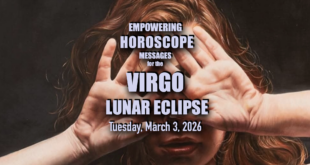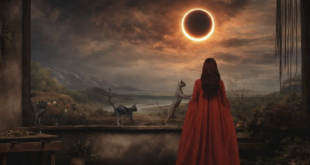
All throughout time, eclipses have been perhaps one of man’s greatest mystery. These phenomenal events – whether it’s the strange disappearance of the beaming Full Moon (ushered by periods of its apparent reddish hue), or, even more profoundly, the day momentarily turning into night – has mesmerised and astounded human curiosity for aeons. Even today, science finds it hard to completely describe how these events affects nature’s rhythms, and from an astrological point of view, there is much we can learn about our life developments just from studying the effect of eclipses upon our charts.
Because eclipses only occur when turning points in the lunation cycle (New/Full Moons) align with the Lunar Node axis, there seems a special ‘karmic fatedness’ in their effect, particularly upon the relationships in our lives. Whilst these remain the greatest mystery, those of us who observe the movements of heavenly bodies against the stars are at least aware of some correlation between these lunation phenomena and major events here on earth.
Here are some things we know definitely know about eclipses:
- Eclipses occur when the Sun, Moon and Earth all come into direct alignment.
- They can be total, annular or partial (Solar), or total, partial or penumbral (Lunar).
- A Solar Eclipse occurs when the New Moon (Sun/Moon conjunction) forms within 18.5 degrees of one of the Lunar Nodes (points where the orbit of the Moon crosses the ecliptic).
- A Lunar Eclipse occurs when the Full Moon (Sun/Moon opposition) forms within roughly 12 degrees of the Lunar Nodes, as the Earth comes directly between the Sun and Moon. The Moon appears dark red while in the Earth’s shadow.
- The actual shadow phase of eclipses lasts between 3-4 hours from start to the end.
- There are usually two Solar Eclipses a year, preceded or followed (and sometimes both) by a Lunar Eclipses two weeks before/after.
- Eclipses actually follow a strange pattern called a Saros Cycle which repeats every 19 years. Consecutive Eclipses belong to different families of eclipses which last between 1200 and 1600 years and contain from 69 to 89 eclipses. There are 38-42 Saros Cycles active at any given time, each at different stages of their evolution. The pattern of Saros Cycles is very complicated.
- The closer an eclipse falls near the Nodes (by conjunction/opposition) the more powerful its effects upon us.
- The exact degree of the eclipse leaves an astrological ‘memory’ which then becomes triggered/activated by transits, either prior or after the event. (eg. observe effects as planets cross 18° Pisces 57′.
- Eclipses merged with any other transiting planets (eg, conjunction to Chiron) tend to infuse a strong flavour of that planet’s energy into their usual effect.
- The ‘usual’ effect of eclipse is to leave a phenomenal impact on our individual lives. Matters affected by the astrological natal house of your chart where the eclipse falls seem to get enormous attention.
- Effects actually start to show months before the actual eclipse, staying in theme for up to 2 years, and manage to irrevocably transform our lives for ever.
- If an eclipse aligns with one of your planets then this is a significant event, and proximity of the alignment increases the potency. Check what house in your chart is ruled by that natal planet, and any aspects made by that planet. It is possible, if this is a highly significant ruling planet (rules Sun, Moon or points on the Asc/MC axis), or holds many aspects, that this is an important time which could transform many aspects of your life.
- Eclipses on your Sun are critical. If one falls on (or near) your birthday, know this will be a critical year for you (Sun rules your basic life-force and your entire identity structure). The sign/house/aspects of your natal Sun provide more distinct clues on how exactly you may be affected, but health, confidence, decision-making power and general vitality are critical factors to watch during Sun contacts.
- Eclipses on your Moon, Mercury, Venus, Mars will also be felt most personally, and the flavour of the eclipse (Solar/Lunar – North/South Node) will add weight or embellish the potency of the event in different ways. Solar eclipses activate or energise a latent form of expression and thus augur a life-changing new field of experience for us, whilst Lunar eclipses force us to reflect on key internal/emotional turning points and often indicate major endings. Eclipses tied to the North Node are more about receiving, South is more about giving.
- Whilst New Moons are generally a good time to initiate/launch an event or enterprise, Solar Eclipses are NOT such a good time for this. Anything started now (or just prior) stands to be ‘eclipsed’ by a seemingly unexpected environmental/circumstantial factor, creating a “rain on the parade” effect.
- Always remember that the intense power of the Sun, combined with the physical proximity of the Moon is what makes lunations feel like a totally personal experience, and whilst these celestial events affect you in a most personal way, their highly illuminating effect during eclipses brings those personal affairs to shine much brighter out in the open than usual.
 angstoic.com Astrologer, Ang Stoic
angstoic.com Astrologer, Ang Stoic



